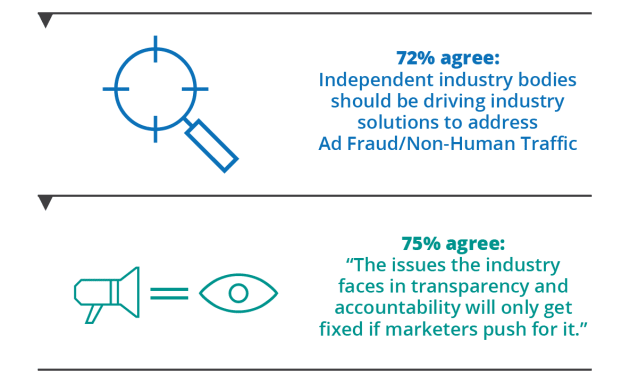
In our first Media Trust report last year, we investigated the industry’s view on whether or not trust was a fundamental factor in media trading. The answer was yes.
In this year’s report, The Trust Equation, we were keen to gain more insight in terms of the influence of trust in dollar terms and discover how much it affects media spend decisions.
We were also curious to gauge, in the wake of growing distrust in digital channels as indicated by Marc Pritchard’s now infamous IAB speech and Facebook’s increasingly tarnished report card, how various digital channels are stacking up in terms of trust.
What we found should come as little surprise to anyone that has been following the recent industry transparency conversation. While there was an across-the-board increase in the desire for more industry oversight to build trust, the top channels seen to be needing oversight were programmatic trading, social media, online video/streaming and mobile. Year-on-year, each of these channels saw significant increases with programmatic and social jumping right up in terms of awareness of issues.
While the top four trust issues concerning the industry were the same year-on-year, the order shifted significantly with ad fraud jumping up the priority list in 2017. Last year, it was interesting to us that ad fraud was not higher on the industry radar – it was the second lowest priority. In 2017, it has experienced the highest jump of any issue from 27% to 44%. The sharp increase in awareness shows it’s a growing issue that the industry needs to address.
Ad blocking rose by double percentage points, as did ‘proof of posting’, evidence that the ad actually appeared, likely driven by the continued move towards programmatic ad trading.
The issue of brand safety nudged up but we believe a larger jump would be expected if the survey had been timed in the aftermath of this year’s YouTube boycott.
Trust = Money
Broadly, the 2017 survey tells us that 86% of marketers and media agencies are more willing to spend in channels where trust has been established. For the majority of the industry, both agency and client side, trust equals money. This is cemented by the statistic that 8 out of 10 will prioritise media channels that supply transparent, audited data. Advertising trading doesn’t run purely on money and analytics – it also runs on trust.
Trust is vital to the industry and it has absolute economic value. That can be a little hard to wrap your head around in this post-truth world where platforms have come clean on incorrect and inflated figures and when the sheer volume and complexity of data means evaluation has become subjective.
The good news is that the survey showed unequivocally that the industry does value accreditation frameworks which provide governance and acknowledgement for doing the right thing. In fact, 92% agreed that industry codes and best practice can be pointless if no one is verifying that they are truly being adopted. So perhaps instead of viewing industry
self-regulation frameworks in terms of ROI, a better question is – what the cost would be for not acting? Can we afford to let trust continue to erode?
It’s more about risk minimisation and assurance. It’s about protecting our business partnerships and also our industry.
Don’t think this is an issue we can choose to ignore. For agencies, there is much at stake. Already 70% of marketers in our sample and 60% of agencies agreed poor industry transparency will lead to more marketers taking their media buying in house.
For the publishers and tech players in the space, there are ramifications for allowing trust to take a back seat. We have seen clients act to protect spend with the recent YouTube issues, a move which is forecast to cost YouTube’s parent company Alphabet $US750 million.
As a self-regulated industry, we need to ensure that the parameters of ad trading are in place. Clients must have clarity on what that means and they need to be able to trust that best practices are implemented and upheld. At the AMAA we believe the future of our industry depends on it.





By Audited Media Association of Australia CEO Josanne Ryan


